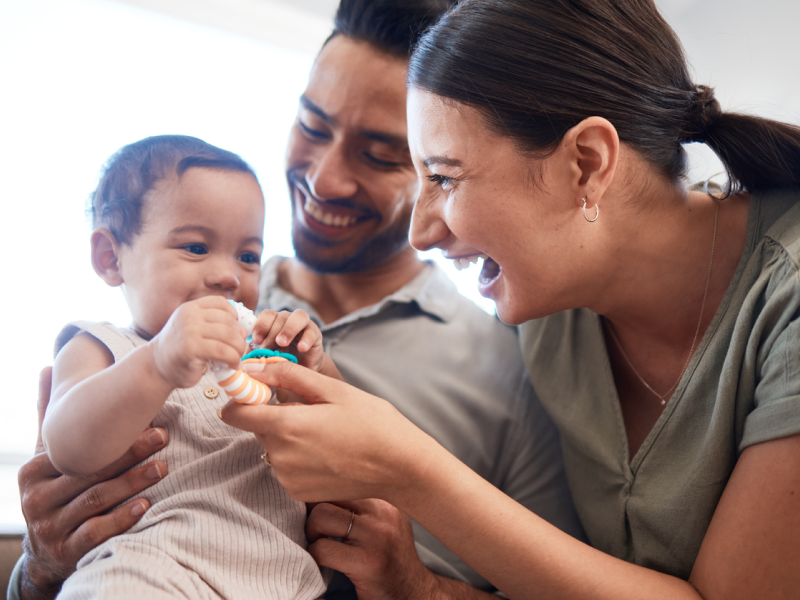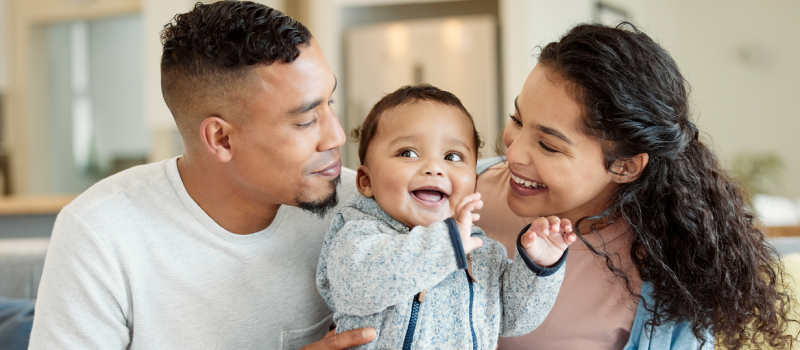
Table of Contents
Real Tips: Mental Health Advice for New Parents

Written By: Alex Bachert, MPH

Clinically Reviewed By: Dr. Don Gasparini
August 4, 2023
8 min.
Balancing parenthood and your mental health can be tough, but having access to mental health information and resources can make it more manageable. Learn how to spot postpartum depression, plus tips to support your mental well-being.
Learn more about our Clinical Review Process
Table of Contents
5 ways to support your mental health as a new parent
Becoming a parent is a huge deal. Whether you’ve just had your first child or are welcoming another little person into your growing family, few things will change your life in the same way as parenthood. And like with any major change in life, it’s important to take care of yourself as you learn how to navigate this new role.
Burnout may be a buzzword these days, but parental burnout is a very real concern. When parents focus their energy and efforts solely on their children, they tend to neglect their own needs. Burnout creates a toxic cycle of shame and guilt for being tired, which can take a real toll on your mental health. Here are a few tips to help you protect your mental health, avoid burnout, and be a more present parent and partner.
1. Be gentle with yourself
When you found out you were expecting a child, you probably spent some time preparing to be a parent: shopping for baby gear, researching sleep training tips, or simply browsing one of the many blogs or social media accounts focused on parenting.
So what happens when your first few days, weeks, or even months as a new parent don’t go as planned? It’s common for new parents to have negative thoughts and feelings, such as:
- Feeling like a bad or incapable parent
- Feeling like you’ve lost a part of yourself
- Feeling tired or moody due to lack of sleep
- Wondering if your child will like you
- For moms, pressuring yourself to bounce back like other moms on social media
All of these thoughts and concerns are completely normal when you’re in the thick of it, but it’s important to, when possible, refocus your thoughts and be gentle with yourself: Try to remember that you’re doing a great job and that it will get easier.
2. Make time for self-care
Between the early mornings and the late nights, it can be easy to lose yourself in the newborn fog. You probably have less time to dedicate to self-care, but there are plenty of simple ways to help you prioritize your well-being and feel your best.
Not sure where to start? Here are a few small practices that are just for you.
- Take a hot bath or shower
- Go for a drive and listen to your favorite music or podcast
- Take a walk around your neighborhood
- Reserve 5-10 minutes per day for mindfulness, meditation, and relaxation techniques
- Make a smoothie or another nourishing snack
- Journal

Being a new parent is hard.
We’re here to support your mental health. Connect with other parents and take care of your mental health.
3. Prioritize your relationship with your partner
With the new titles of mom and dad, it can be easy to forget that you chose to be partners before you became parents. Relationships often change when people become parents, but it’s important to continue to love and respect one another. Here are some simple ways to prioritize your relationship with your partner as a new parent:
Be fair
When the baby is crying, the laundry is piled as high as your front door, and you can’t remember the last time you drank water, you might find yourself picking a fight with your partner. Although it can be tempting to bicker over who’s making more of an effort, it’s important to remember that you’re both doing your best.
Date
You may not have the energy (or a babysitter) to go on a date night, but you can find an hour per week to sit down with a cup of coffee or watch a movie. Date nights are going to look different for awhile, but the important thing is spending quality time together.
Communicate
Listening, talking, and managing conflict are always important in a relationship, but especially so when both partners are tired, stressed, and overwhelmed. Prioritize healthy communication to help both people feel understood and respected.
4. Build a support system
Have you heard the phrase “it takes a village?” Well, they say that for a reason. Look for support groups in your area for an opportunity to connect with other parents who are going through similar experiences (both the challenging moments and the celebratory milestones) with their families. Joining a parenting group offers people to chance to:
- Get out of the house and socialize
- Ask advice and troubleshoot problems with other parents
- Connect with people who understand exactly what you’re going through (including the stress and anxiety)
- Hold yourself accountable to achieve your own goals, including self-care
- Participate in community fitness programs to improve physical and mental health
5. Recognize when it’s time to seek professional support
Sometimes self-care and strong communication skills aren’t enough to help people manage the stress and anxiety of being a new parent. If being a new parent has taken a toll on your mental health remember that you’re not alone and don’t hesitate to seek support.
How parenthood affects your mental health
Many new parents are so focused on keeping their baby healthy, that they forget to dedicate the same level of attention to their own mental health. When you’re consumed with feedings, diapers, and doctor appointments, it can feel tough to find time to prioritize your wellness or check on your partner’s feelings. But when you don’t remember to take care of yourself, it can lead to serious burnout and even mental health issues. Studies show that in the year following birth, approximately 13% of women will experience anxiety and up to 21% will experience symptoms of depression. Men also feel stress about pregnancy and birth, which can contribute to health issues like anxiety, depression, psychological distress and fatigue when left untreated.
Balancing parenthood and your mental health isn’t always easy, but having access to mental health information and resources, including professional help, can make it more manageable.

Signs of depression or anxiety in new parents
You’re back home with your new baby, and you feel so much love and joy. So why do you feel a little sad, too? New parents commonly struggle with intense and conflicting emotions as they learn how to fill their new and evolving roles in their family. Many new moms, for example, will experience something called the “baby blues.”
Caused by a change in hormones as your body gets used to no longer being pregnant, the baby blues usually start four days after birth and end within two weeks. Symptoms of the baby blues include anxiety, irritability, impatience, sadness, insomnia, mood changes, and crying for no reason.
Another, more serious, condition that can affect new parents is postpartum depression. Postpartum depression is a type of depression that occurs after the birth of a child. It’s most often associated with the birthing person, but research shows that it can also affect partners, surrogates, and adoptive parents. Being a new parent or caretaker involves hormonal, emotional, physical, social, and financial change — all of which can contribute to postpartum depression.
While symptoms of the baby blues usually subside after a few weeks, postpartum depression can last for a year or longer. The hallmark symptoms of baby blues are irritability, fatigue, and sadness, while postpartum depression usually involves more serious symptoms such as severe stress and aggression.
Postpartum depression is usually treated with psychotherapy, medication, or a combination of the two. Many therapists will use cognitive-behavioral therapy (CBT) to help parents with postpartum depression align their thoughts and actions with their mental health goals.
CBT was designed to help people understand the way their thoughts, feelings, and patterns of behavior are linked to their mental health struggles. Cognitive behavioral therapists are trained to help people:
- Deal with difficult emotions
- Improve relationships
- Improve self-confidence and self-esteem
- Cope with stress
- Change negative thoughts
- Manage mental health disorders
Postpartum depression in women
Postpartum depression affects approximately one in seven women in the United States. For many women with postpartum depression, this is their first experience with depression. However, once you have postpartum depression, you’re at an increased risk to experience it with subsequent pregnancies.
As mentioned, postpartum depression can affect anyone, but it is thought to occur in women for several reasons: fluctuating hormones following birth (estrogen and progesterone), low levels of thyroid hormones, genetic disposition for depression, and other social or financial circumstances.
So how do you know if you have postpartum depression? Below is a list of common symptoms. Most women with postpartum depression will experience several of these symptoms, but the type and severity may change over time if left untreated.
- Depressed mood or severe mood swings
- Intense irritability and anger
- Severe anxiety and panic attacks
- Change in appetite
- Sleeping too much or too little
- Fatigue
- Hopelessness
- Less interest and pleasure in activities you used to enjoy
- Feelings of worthlessness, shame, guilt or inadequacy
- Trouble thinking, concentrating, or making decisions decisions
- Restlessness
- Difficulty bonding with your baby
- Withdrawing from family and friends
- Thoughts of harming yourself or your baby
- Recurring thoughts of death or suicide
If you’re experiencing suicidal thoughts or think you’re in danger of harming yourself, this is a mental health emergency. In this case, you should contact The Suicide & Crisis Lifeline by calling or texting 988.
Postpartum depression in men
Although less commonly discussed, men can experience postpartum depression too. In fact, around one in 10 fathers experience pre- or post-natal depression, and up to 18% struggle with anxiety during the weeks before and after birth.
Although hormones can’t contribute to postpartum depression in men, they may develop the condition for other reasons. Since women go through the physically demanding process of growing and delivering a baby, some fathers and partners struggle to find ways to compensate once the baby arrives. Also, partners who didn’t carry the baby during pregnancy, may have concerns about bonding with the child. The financial burden of supporting another family member, lack of resources around being a new partner, witnessing a negative or traumatic birth experience, and balancing fatherhood with other aspects of life can all lead to postpartum depression.
Here are common signs of postpartum depression in men.
- Anger, sudden outbursts, or violent behavior
- Irritability
- Low motivation
- Poor concentration
- Withdrawing from relationships
- Working a lot more or a lot less
- Suicidal thoughts
- Risky behaviors, such as drug or alcohol abuse
- Headaches, muscle aches, or digestion issues
Navigating parenthood with Charlie Health
If you’re struggling with becoming a new parent or need some help managing your stress and anxiety, Charlie Health is here to help. Our compassionate team of mental health professionals are here to listen to your story, understand your needs, and match you with an appropriate treatment plan to help you feel your best for both you and your child.
Charlie Health’s personalized virtual Intensive Outpatient Program (IOP) offers mental health treatment for families who are dealing with a variety of life changes and mental health struggles. Fill out this short form to get started today.
References
https://americanpregnancy.org/healthy-pregnancy/first-year-of-life/baby-blues/
https://www.marchofdimes.org/find-support/topics/postpartum/baby-blues-after-pregnancy
https://www.marchofdimes.org/find-support/topics/postpartum/postpartum-depression
https://mhanational.org/mental-health-and-new-father
https://www.henryford.com/blog/2019/06/baby-blues-vs-postpartum-depression
https://jamanetwork.com/journals/jama/article-abstract/185905




